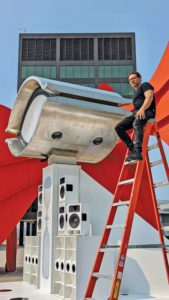They meet in the visionary brain of Noah Kaplan, a 1995 U-M art grad and founder of Leon Speakers, an audio and design company based near the Ann Arbor Airport. On a sunny day in September, a crew at its three-building campus was constructing the art piece—whose first iteration appeared to Kaplan in a dream.

Leon Speakers founder Noah Kaplan with his interactive art installation in Grand Rapids. The idea for “Eiro” came to him in a dream.
“Eiro,” a mammoth sculpture featuring speakers and video screens with an enormous eye atop it all, was being prepared for competition at ArtPrize in Grand Rapids. Kaplan, its “chief imagination officer,” says he began making sketches of this otherworldly vision as soon as he woke up.
From there, he says, it “evolved and took on its own life.” He originally intended to premiere the piece at the 2020 Borealis festival in Seattle, which mixes art and technology. Kaplan admits now that had he done so, it may well have been a disaster; in the time since then, the sculpture has been tested and a variety of issues fixed.
“At a certain time, Eiro started driving us,” he says. “And then the pandemic hit.” Borealis was canceled, and Eiro was given space and time to evolve.
Evolution is the only constant at the company, which started in the mid-1990s as Noah’s Underground Gallery, an art and music space on N. Main. Kaplan admits that he was “kind of kidding” when he first combined art and audio, creating what was essentially a picture with built-in speakers.
But then he started talking to dealers and realized that they were struggling to bring better audio to flat-screen TVs. Starting from his picture-speaker, he built a thin auxiliary speaker, and the custom, built-to-match soundbar was born.
These days, a team of sixty employees supply about 1,200 residential dealers and another 100 or so commercial integrators with speakers, amplifiers, and tech-concealment cabinets and frames. By volume, their biggest selling product lines are Horizon soundbars ($2,000–$5,000), Tonecase FIT mounts for Sonos smart speakers (starting at $750), and Edge Media frames ($3,000–$6,000). Prices range so widely because everything is customizable, from dimensions to fabric to grille, but “nothing we do is inexpensive,” Kaplan laughs.
Heading into the quirky, vintage-heavy warehouse shared by Leon’s offices and the Leon Loft performance space, he stops by a detailed screen print of a lion: “And this,” he says, “is everything to us.” He calls the lion his “spirit animal.” Sales and marketing director Carolyn Ceccoli says the creature is “emblematic of everything the Leon brand stands for: strength, adaptability, pride, and a fierce appetite to discover what’s next—with the audacity to put it out there.”
The way Kaplan talks about looking for and then happening upon this “perfect,” “austere” “lion of Leon,” it sounds like kismet. As if on cue, the artist, Chris Saunders, walks in. He just happens to be here today signing limited-edition prints that the company will sell as part of its twenty-five-year anniversary this year.
In addition to Eiro, Kaplan is also the creator of an enormous lion mural on the Leon campus. Every year, he paints a portrait of a musician and posts a time-lapse video of the process. Recent subjects include Aretha Franklin and Bob Dylan.
In this art-forward environment, improving the comfort and appearance of people working remotely seems almost mundane. But that’s what Kaplan aims to do with Leon’s latest product, “Cove.”
In the pandemic, he says, “computer became phone, phone became computer.” Suddenly, everything was happening online; telepresence was the work life of many—and Kaplan, a designer who hadn’t previously even owned a desktop computer, struggled.
Cove’s first iteration was a suitcase, the next a pop-up tent. The team eventually settled on a sleek, clean-lined enclosure to surround a laptop or monitor.
Cove will be Leon’s first product sold directly to consumers. Kaplan calls it “an elevated workspace” and discusses its features—lighting that reduces eye strain, optional high-quality camera and speakers, made with almost no waste—almost reverently.
“Everything has meaning,” he says as he weaves through the building. He sees Cove as “the same setup” as Eiro: interactive, video, speakers, lights, or, as he puts it, “balance by design” with a “big, grand eye” on societal shifts.
Ceccoli puts it more succinctly: “Our mission has always been to mix art with audio and design with technology,” she says. “Eiro does just that on a whole new scale. Noah and the team always push the boundaries of creativity and possibilities.”
What will happen to Eiro after ArtPrize? “That’s a good question,” Kaplan texts. Cove is planned to go into production in 2023 at a starting price of $725.



